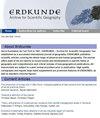Experiences of place-bound sociality amidst the COVID-19 pandemic: A qualitative analysis of environment-related coping strategies
IF 1.1
4区 社会学
Q3 GEOGRAPHY
引用次数: 1
Abstract
In the context of the COVID-19 pandemic, places of public encounter were effectively inhibited by lockdown regulations. In addition to several quantitative studies of the impact of the ongoing pandemic on society, little is known about the use of one’s spatial environment on individual coping strategies mitigating physical isolation. Through an explorative qualitative study we derived a typology of coping strategies that helped participants to balance responsible action and the urgent need for social contact.Our approach aligns with well-known theory in the field of place (Cresswell 2020) and place-bound sociality (cf. Schatzki 2002) in the context of phenomenology (Sloan & Bowe 2014, Rehorick 1991, Seamon 1979). Sixteen participants were selected reflecting diverse conceptualisation of community and representing socioeconomic and gender diversity in both urban and rural areas of the German state of Bavaria. Semi-structured interviews were conducted in the beginning of the second wave of COVID-19 restrictions from the end of November 2020 to early December, to reflect expectations and early routines associated with the isolation. In addition to social and individual, a variety of environment-related coping strategies can be observed. We (1) interpret those coping strategies, (2) discuss the essential function of places for the coordination and negotiation of social activities, and (3) relate the importance of public spaces to weak social ties (Granovetter1973) emphasising their outstanding value for individual wellbeing.COVID-19大流行中地方约束社会的经验:环境相关应对策略的定性分析
在新冠肺炎大流行背景下,封锁措施有效抑制了公众接触场所。除了若干关于当前大流行病对社会影响的定量研究外,人们对利用空间环境减轻物理隔离的个人应对策略所知甚少。通过一项探索性质的研究,我们得出了一种应对策略的类型,帮助参与者平衡负责任的行动和迫切需要的社会联系。我们的方法与现象学背景下的地方领域(Cresswell 2020)和地方约束社会性(参见Schatzki 2002)的知名理论(Sloan & Bowe 2014, Rehorick 1991, Seamon 1979)保持一致。选出的16名参与者反映了社区的不同概念,代表了德国巴伐利亚州城市和农村地区的社会经济和性别多样性。在2020年11月底至12月初的第二波COVID-19限制措施开始时进行了半结构化访谈,以反映与隔离相关的期望和早期常规。除了社会和个人,还可以观察到各种与环境相关的应对策略。我们(1)解释了这些应对策略,(2)讨论了场所在协调和协商社会活动方面的基本功能,(3)将公共空间的重要性与弱社会联系联系起来(Granovetter1973),强调了它们对个人福祉的突出价值。
本文章由计算机程序翻译,如有差异,请以英文原文为准。
求助全文
约1分钟内获得全文
求助全文
来源期刊

Erdkunde
地学-自然地理
CiteScore
2.00
自引率
7.10%
发文量
17
审稿时长
>12 weeks
期刊介绍:
Since foundation by Carl Troll in 1947, ''ERDKUNDE – Archive for Scientific Geography'' has established as a successful international journal of geography. ERDKUNDE publishes scientific articles covering the whole range of physical and human geography. The journal offers state of the art reports on recent trends and developments in specific fields of geography and comprehensive and critical reviews of new geographical publications. All manuscripts are subject to a peer-review procedure prior to publication. High quality cartography and regular large sized supplements are prominent features of ERDKUNDE, as well as standard coloured figures.
 求助内容:
求助内容: 应助结果提醒方式:
应助结果提醒方式:


